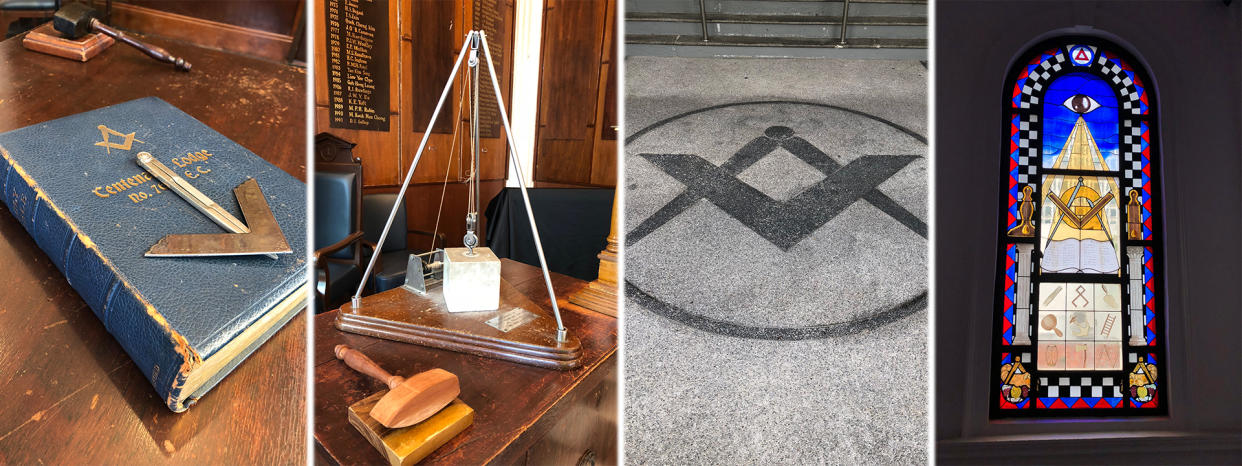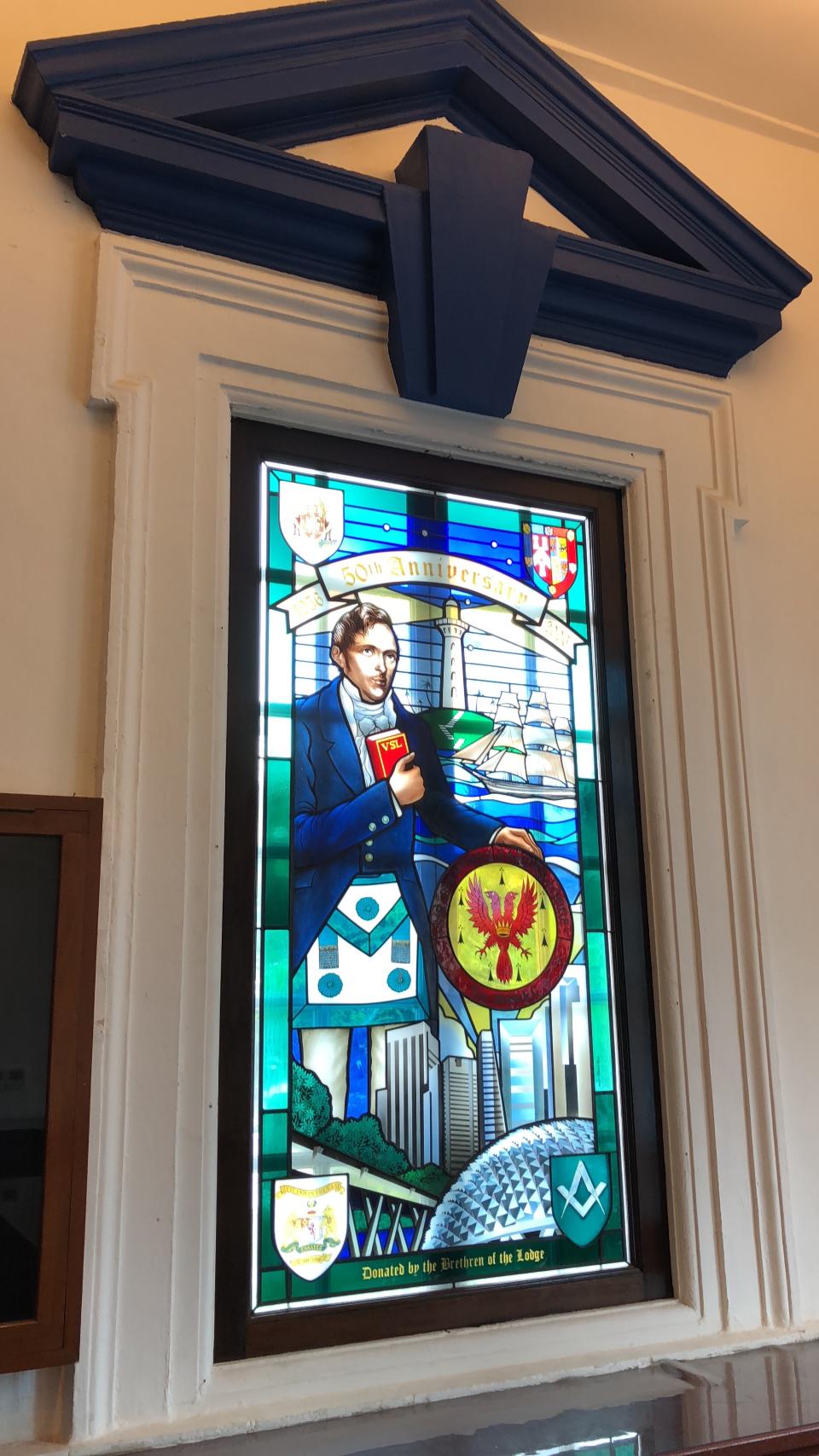The Freemasons of Singapore: Opening up to the modern world

Mention the Freemasons, the world’s oldest fraternal order, and one thing comes to mind: conspiracy theories.
From Dan Brown’s The Da Vinci Code (Freemasons conspired to hide Jesus Christ’s marriage) to the Nicolas Cage-starring National Treasure (Freemasons helped hide a secret treasure in the United States), outlandish conspiracy theories about the Freemasons have become ubiquitous in popular culture.
This has also been fuelled by the prominence of past Freemasons who were typically rich or powerful men: the first United States president George Washington, former British Prime Minister Winston Churchill, the composer Wolfgang Mozart and even founder of Singapore Sir Thomas Stamford Raffles. Many roads in Singapore are also named after Freemasons, such as the former Attorney-General Thomas Braddell.
For the 650 Freemasons of Singapore, who were first organised as a society here in 1845, wild speculation about their order is something they have gotten used to, along with eyebrow-raising rumours of devil worship.
What of the oft-repeated notion that Freemasons are in league with the Jewish people for world domination? “We have trouble even organising dinner, let alone taking over the world,” said banker Tony Raza, 50, with a chuckle.
The American and Singapore permanent resident, who has been a Freemason for a decade, told Yahoo News Singapore that “exotic” depictions of the Masons in popular culture do bring an increased interest in the order.
“We see the inaccuracies pretty clearly…but I don’t think there’s anything wrong with bringing up these interesting historical stories, and maybe glamourising a little bit. If it brings some interest from the outside world, then maybe that’s not so bad.”
Now, for only the third time in its 139-year history, the Freemasons’ Hall at Coleman Street is opening up to the public.
The Centenary Lodge Christmas Market charity event takes place this Saturday (24 November). The event will include a discussion of Masonic history, a rare demonstration of a Freemason ritual and of course, conspiracy theories. Ticket fees will go to Kidz Horizon, a charity devoted to helping children and women with chronic illnesses.
Changing with the times
(Video by Nurul Amirah Haris)
It is all part of a worldwide effort by the Freemasons to adapt to the modern world, and better explain itself to outsiders. Heavy on symbolism, rituals and hierarchy, complete with secret handshakes and grand titles, the Freemasons can give off the vibe of a boys’ club.
When Yahoo News Singapore visited Freemasons’ Hall last Tuesday, it was the first interviews that the Singapore branch of the order had done in more than a decade.
“Historically, we’ve been guilty of being overly secretive in going about what we do,” admitted New Zealander John Matheson, a business and management consultant.
The 60-year-old added, “But in the modern world…all of our rituals are now public knowledge. The only thing that we keep secret are those special handshakes and passwords…which are frankly a lot of fun, but they are really more of ceremonial importance than anything.”
Historically, their secretive nature has helped lead to persecution – Freemasonry has been banned at different times by numerous countries, while thousands of its adherents were imprisoned or killed by the Nazis. In Singapore, some 250 Masons were also imprisoned by the Japanese during World War II.
But the order has certainly become a lot more open – streaming service Netflix is even airing the documentary series Inside the Freemasons, made to commemorate the United Grand Lodge of England’s 300th anniversary.
Freemasonry was first organised as a society in England in 1717. Organised into units called Lodges, it also has a deep history in the Asia-Pacific, with the first Lodge in Asia established in 1765 in Bencoolen, Sumatra. Since then, Lodges have been founded in Malaysia, Thailand, India, Hong Kong, Japan and elsewhere.
The head of a Lodge is called a Worshipful Master. The 53 Lodges of Singapore, Malaysia and Thailand are grouped under the District Grand Lodge of the Eastern Archipelago, which is led by a District Grand Master. Globally, the man who holds the highest position in Freemasonry is Prince Edward, the Duke of Kent.
Freemasonry is not a religious order, but belief in a God is a prerequisite to join. In this regard, the Singapore Lodges include Christians, Muslims, Buddhists and Hindus.
“We use terms that don’t mention God specifically, because every religion has a different name. So we speak of the Great Architect of the Universe,” explained Matheson. “But at the same time, we have a rule that you can’t discuss religion and you can’t discuss politics in the Lodge.”
Truth, fellowship and charity

Nevertheless, Freemasonry has many of the trappings of a religion. For example, Yahoo News Singapore‘s interviews were carried out in a courtroom-like venue at Freemasons’ Hall called the Second Temple, while a larger hall is called the First Temple.
These halls are meant to evoke the Temple built by the great Israelite King Solomon, and have a similar layout. Solomon’s Temple is a central symbol in Freemasonry. Sacred texts such as the King James Bible or the Quran are typically on display during Masonic meetings and are referred to as a Volume of Sacred Law.
The order is founded on three grand principles: truth, fellowship and charity. Matheson explained that Lodge meetings typically consist of two parts: firstly, administrative matters and discussions of charitable works, and secondly, elaborate rituals such as initiation rites, complete with regalia.
Then there is what is called “passing to the second degree” and “raising to the third degree”, or in layman’s terms, rising in the ranks. “These are very ancient rituals that have changed little over the past two or three hundred years,” said Matheson, who added that it is part of the learning process of how Freemasonry works.
“The second degree is about the learning. Every degree has its own theme. And so the hidden mysteries of nature and science are at the foundation of the second degree. Every degree has its own intrigue. When an initiate goes through the ceremony, often they remember very little of it, because there’s so much being thrown at them.”
How does one become a Freemason?

For all the talk of symbolic rituals and conspiracies, the process of joining the Freemasons is surprisingly mundane: one simply applies directly to the organisation. In Singapore, only men above the age of 21 with no criminal records may apply. They must then undergo a vetting process that can take up to a year.
While there is a bias towards professionals, Matheson stressed, “We certainly don’t go looking for the rich and famous, that’s not our selection criteria. We strive for balance. We don’t want a Lodge of lawyers or a Lodge of bankers. We want a cross-section of Singapore society.”
Asked if membership is for life, he replied drily, “It’s one of those great myths. It’s not the Hotel California. You are able to resign at any time.”
Depending on the size of the Lodge and its geographical location, yearly membership fees range from about $400 to $800. These go toward maintenance of the building, regalia, administrative costs, and charity efforts.
Singaporean Ellery Ngiam, 39, has been a Freemason for three and a half years. Drawn by curiosity and an appetite for “esoteric knowledge”, he is grateful for the opportunity to do charity work and make new friends.
“(Before I joined), my perception was always coloured more on the sensational side, because that’s what’s available on the Internet. (But) I wanted to find out for myself (and) I have no regrets.”
Like Ngiam and Raza, Matheson welcomes the order’s efforts to be more open. “I think it’s a very welcome initiative to…break away from that historical secrecy. It has no logical foundation.
“It’s just that we inherited a system where, my father and grandfather (were) Freemasons, we never spoke about Freemasonry in our house, which is very strange. But these days, it’s a far more open fraternity.”
More information on the Centenary Lodge Christmas Market can be found here.
More Singapore stories



